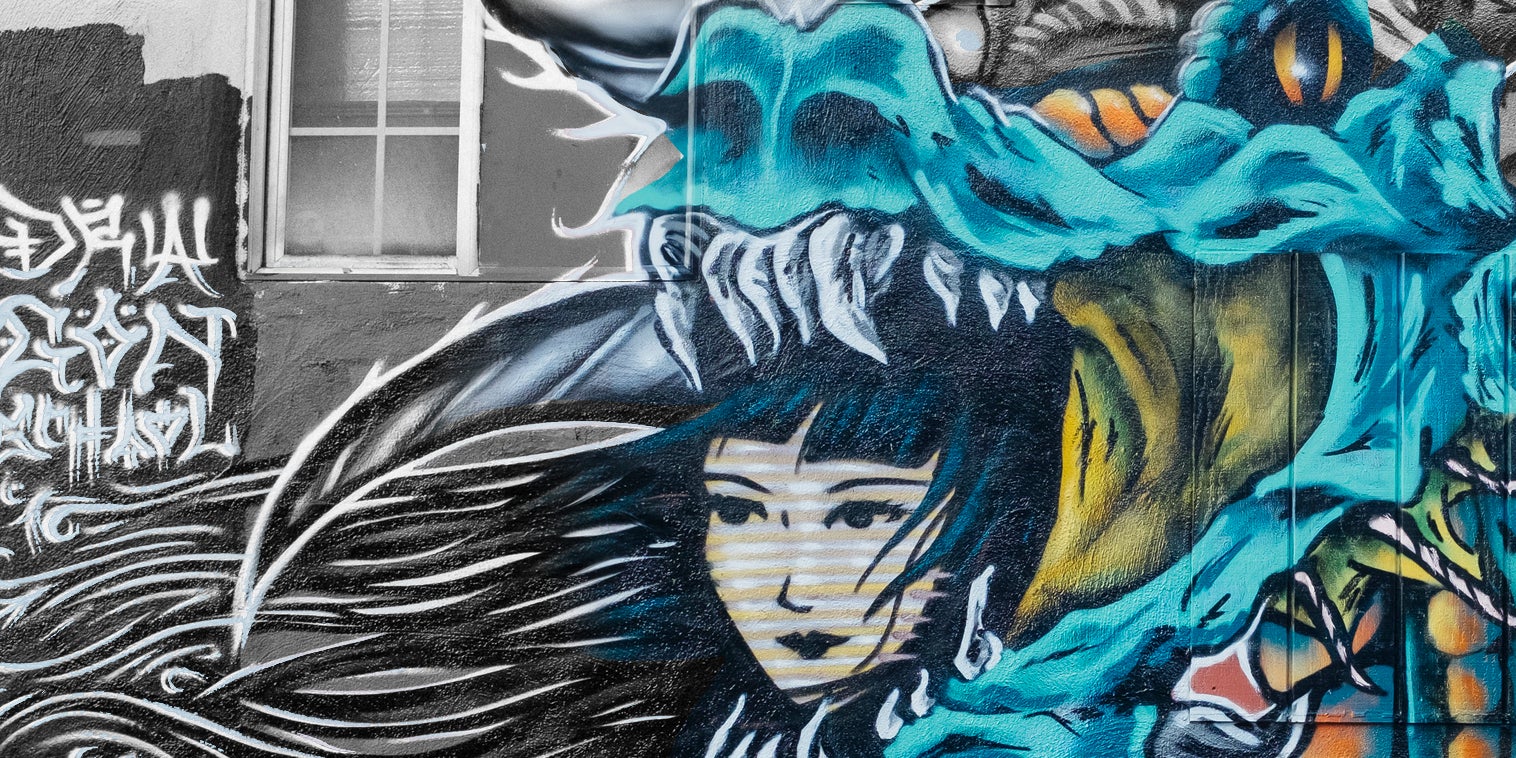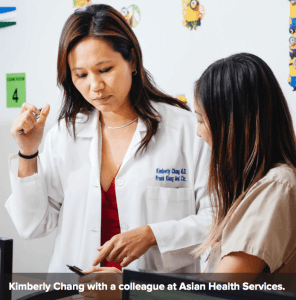
A disheartening encounter with a young patient convinced physician Kimberly Chang, MPH ’15, that medical professionals can play a key role in protecting victims of coerced sex and labor.
Kimberly Chang was fresh out of medical residency in 2003 when a 14-year-old girl stumbled into her exam room at Asian Health Services in Oakland, California. Reeking of marijuana, with bloodshot eyes and bruises all over her body, the girl asked to be checked for sexually transmitted diseases (STDs).
Chang, MPH ’15, diagnosed several STDs in the teen—and, with a sinking realization, also determined that her patient was being forced into sex, addicted to drugs, and getting beaten up regularly. Over the next few years, Chang would see the scenario repeated again and again among her mostly poor, immigrant patients.
 “Back then, I referred to them as ‘child prostitutes.’ That was so bad of me,” Chang says, cringing at the implicit blame in that term. “But we didn’t have the right language, and I didn’t have the awareness.” Over time, as her own understanding grew and as the effects of the Trafficking Victims Protection Act of 2000—the first comprehensive federal law to address human trafficking—filtered down to the clinic, Chang redefined these patients as victims, forced by poverty or isolation into a life of servitude, often trading sex for money or drugs.
“Back then, I referred to them as ‘child prostitutes.’ That was so bad of me,” Chang says, cringing at the implicit blame in that term. “But we didn’t have the right language, and I didn’t have the awareness.” Over time, as her own understanding grew and as the effects of the Trafficking Victims Protection Act of 2000—the first comprehensive federal law to address human trafficking—filtered down to the clinic, Chang redefined these patients as victims, forced by poverty or isolation into a life of servitude, often trading sex for money or drugs.
Yet she continued to view her job as primarily treating their medical problems—until the day a young teen girl arrived at the clinic, acutely ill. She had a high fever, a racing heart rate, and a rash all over her body. She’d lost 30 pounds in three months. But she refused to go to the hospital because she feared she’d be arrested on a previous warrant for prostitution.
Chang spent the entire evening negotiating with her. The girl was willing to drive only with her “purchaser”—a man who bought unprotected sex from her three times a week. For two hours, Chang tried to persuade the man to drop the girl off at the emergency room. They never made it, and it took another day before Chang and her colleagues tracked down the girl through her MySpace page and community contacts. This time, Chang personally arranged for someone to drive her to the hospital, where she spent two months recovering.
“But guess what happened when she got out?” Chang asks, still incredulous. “She was sent to jail.” Although the teenager was essentially an abused child, the police and courts considered her a criminal. That 2008 crisis became the catalyst for all that followed in Chang’s career. She evolved from physician to physician-activist to—bolstered by her new master’s degree from the Harvard T.H. Chan School of Public Health—policy advocate. Today, she is propelled by a strong belief that human trafficking should not be a law enforcement but rather a public health issue.
TEACHING PATIENTS THEIR RIGHTS
Chang grew up in Honolulu, Hawaii, in an ethnically Chinese family. Only recently did she learn that her great-grandmother, born in Vietnam, was kidnapped by pirates and sold into slavery in Hong Kong before escaping and starting a family in Hawaii as a plantation worker. “Given the work that I’m doing now,” Chang observes, “I thought that was an interesting connection.”
As a young child, Chang would watch her mother, a speech pathologist, work with children with cerebral palsy. “That care and compassion made a big impact,” she says. At age 12, she set out to be a doctor, calculating to the exact year when she would begin her training as a physician and proceeding straight through college, medical school, and residency before landing at Asian Health Services as a family doctor.
Many of her teen patients came in high on drugs and physically battered. She learned to speak with them bluntly yet sympathetically, to identify who was being forced into sex, and to care for them without judgment. She also made a point of teaching them their rights. In the case of adult patients working as domestic help, for example, she’d explain: “It’s not OK for your employer to hold your passport and stop you from leaving the country.”
Chang was soon promoted to director of a satellite clinic of Asian Health Services. The site served 10 Asian refugee communities but had to turn down many more for lack of language abilities and staff. “It bothered me when I thought about who gets access and who doesn’t. Where is health equity in this?” she says. “I felt I needed to acquire the policy tools to be able to elevate the issues of immigrant and refugee health and of trafficking in the health care, community health, and public health arenas.”
That quest brought her to Harvard Chan through the Commonwealth Fund Mongan Fellowship in Minority Health Policy. There, Chang met people who, like her, were working for populations shut out of mainstream culture and medicine. Her driving goal: to turn human trafficking into a frontline health issue. “How could I make the health care system stronger, so that it could go toe-to-toe with the criminal justice system?” she recalls. “Harvard Chan has given me a platform to make practical changes and reach more patients—not just through my health center but through every health center that wants to take on this issue.”
Commonwealth Fellowship program director Joan Y. Reede, MPH ’90, SM ’92, notes that Chang stood out for her compassion, her creativity—and her impatience at the slow pace of change. “Kim is an extraordinary individual who does not recognize how extraordinary she is,” Reede says. “She hadn’t realized her full potential when she arrived, and over the course of the year she had an awakening that you can make a difference—not by aiming low, but by aiming high.”
Helping young people avoid the sex trade, or get out early, can slow the problem downstream. “By reducing the number of victims,” says Chang, “you can reduce the number of traffickers.”
At Commencement, Chang received the School’s Dr. Fang-Ching Sun Memorial Award for her commitment to vulnerable populations. According to Reede, “It comes out of a deep awareness of the responsibility that accompanies the title of physician—to take care of everyone—and an understanding that the system has that responsibility as well.”
LOOKING UPSTREAM
With MPH in hand, Chang is back at her clinic in Oakland, where she continues to see patients part time. In collaboration with the Association of Asian Pacific Community Health Organizations, she’s also putting into action a policy brief she wrote while at Harvard Chan for the Health Resources and Services Administration, part of the U.S. Department of Health and Human Services (HHS). In line with that effort, she hopes to collaborate with HHS to create pilot models at federally qualified health centers for step-by-step protocols for trafficking victims, from outreach to long-term chronic care, providing the medical roadmap she wishes she’d had when starting out as a community doctor.
As befits a newly minted public health professional, Chang is also looking upstream at original causes. She believes the first step to stop trafficking at its source is to treat it as a disease. “I see this as community surveillance,” she says. “We talked to the Cambodian elders about this problem, and they started looking out and noticing that, oh, their daughters aren’t just going out and having fun. They’re coming home with bruises.”
Although Chang’s patients were typically trafficked by men outside the family—pimps and boyfriends, for example—it’s not uncommon for people to traffic their own family members for economic reasons. Targeting the poverty that leads these families to such desperate measures is critical, Chang says. So is persuading them to reassess what may have become commonplace—in the exam room, in schools, at community gatherings. “We need to change the social norm,” she says, “and redefine what communities consider acceptable.”
In the complex world of trafficking, a victim today may become a recruiter tomorrow. Chang contends that helping young people avoid the trade, or get out early, can slow the problem downstream. “By reducing the number of victims,” she says, “you can reduce the number of traffickers.”
On a more systemic level, Chang urges public health leaders to join initiatives against human trafficking. “At the moment, most of these are run by criminal justice,” she says. “There’s a scarcity of health care and public health in there.”
LIFE AFTER TRAFFICKING
Looking back at her most disturbing cases, Chang has seen that the right treatment and policies can change lives. The first 14-year-old girl who came in high and bruised? Chang treated her STDs, encouraged her to leave the sex trade, and wrote her a letter of support to get into a health assistant training program. Now in her twenties and in a stable relationship, the young woman has a new outlook on life. “Her main challenge today,” notes Chang, “is college algebra.”
But not all stories from the clinic have happy endings. Chang lost touch with the 15-year-old patient who went to jail for prostitution. She heard the girl became pregnant and was still engaged in sex work. Yet such setbacks don’t discourage Chang.
“I have the privilege of being asked the question, ‘How do you not get demoralized?’ My patients don’t have that privilege,” she explains. “I don’t get demoralized because I have the power to change things. If I don’t use that power, who will?”
Karen Brown is a public radio reporter and freelance writer based in Western Massachusetts who specializes in health and mental health issues.
Watch a video or listen to a podcast of Kimberly Chang and other Harvard Chan students.







